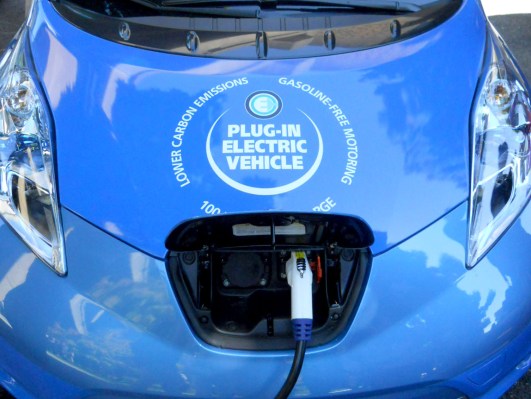Electric vehicles come out of the gate with green cred. They don’t even have tailpipes because they don’t have any emissions while they’re driving. But do EVs deserve their goody-too-green rep? A report from the Union of Concerned Scientists says they do indeed. Even if you take into account the battery, the manufacturing process and even the recycling and disposal process, EVs are the source of fewer greenhouse gases over their lifetimes than gasoline-powered vehicles.
The UCS modeled the two best-selling all-electric vehicles in the United States, the Nissan Leaf and Tesla Model S, and compared them with an average of gasoline-powered models of similar weight and size, such as the Ford Focus and Audi A8. The Leaf was considered a “mid-size mid-range” vehicle with its 24 kWh battery, while the Model S was a “full-size long-range” car with an 85 kWh battery.
There are two common caveats people mention when talking about the cradle-to-grave emissions of an electric vehicle: the resources required to make the lithium-ion battery and the source of the electricity used to charge the car.
It’s true, according to the UCS study, that manufacturing a lithium-ion battery produces a lot of greenhouse gases. “The larger the battery, the greater the vehicle range; but also the greater the weight added to the vehicle and the greater emissions from manufacturing the battery,” the report notes. So the Tesla battery goes 265 miles on a charge, but it also emits more greenhouse gases to make that battery.
The good news is that emissions-free driving in an EV makes up for those greenhouse gases more quickly than a gasoline-powered car makes up its manufacturing emissions. The Leaf-like car would offset those emissions in 4,900 miles of driving, and the modeled Model S would take 19,000 miles, using the average U.S. electricity grid mix as a source for charging. In both cases, that’s about a 50 percent reduction in emissions compared to the gasoline cars over their lifetimes.
As for the source of the electricity, no matter where you live in the United States, even if your local utility includes coal in the mix, an EV will produce lower global warming emissions than the average new gasoline powered car getting 29 mpg. Coal use is dropping, though, so in two-thirds of the country, driving an EV will have lower emissions over its lifetime than a 50-mpg gasoline car.
So even with the admittedly emissions-intensive process of manufacturing the battery and the possibility of using coal to charge up every night, the UCS found that modern EVs are cleaner from cradle to grave and well to wheels than most gasoline-powered vehicles on the road today. EVs still aren’t for everyone — if your commute involves mountain passes or sub-zero temperatures, you might want to hold off. But if you were looking for one more reason to go electric, this might be it.
